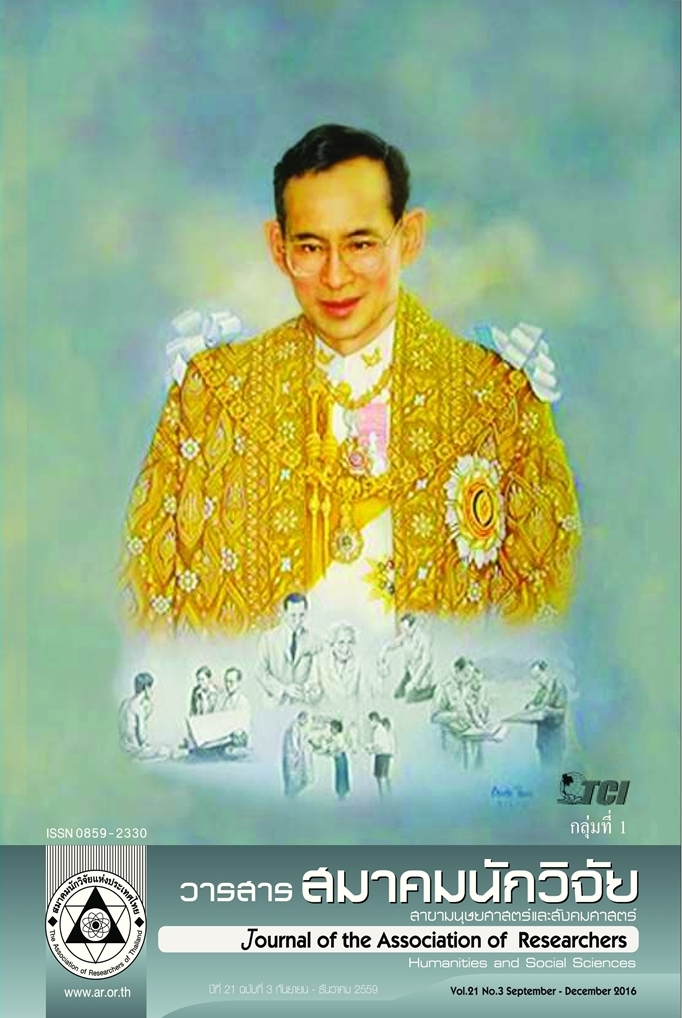The Influence of Transformational Leadership and Public Mind on the Organizational Citizenship Behavior of the Volunteer Reserve Forces
Main Article Content
Abstract
The objectives of this research were 1) to study the level and relationship among transformational leadership, public mind and organizational citizenship behavior of the volunteer reserve forces. 2) to study relationship between transformational leadership, public mind and organizational citizenship behavior of the volunteer reserve forces. 3) to study the influence of transformational leadership on public mind of the volunteer reserve forces. 4) to study the influence of public mind on organizational citizenship behavior of the volunteer reserve forces. 5) to study the influence of transformational leadership on organizational citizenship behavior of the volunteer reserve forces both directly and indirectly via public mind variables. Sample was the volunteer reserve forces of Territorial Defense School. Judgmental sampling was conducted, and the sample size of 400 respondents is completed. The results reveal that the analysis of a structural equation that factors in transformational leadership (LD) is positively correlated very high level with public mind (PM) are statistically significant (LDnPM, φ = 0.741, p< 0.01) and the variance factors can be explained and predicted by leadership 54.90. Public mind (PM) has a positive relationship in a very high level with the organizational citizenship behavior (OCB) with statistical significance (PMnOCB, φ = 0.829, p< 0.01) Transformational leadership (LD) is positively correlated very high level with the organizational citizenship behavior (OCB) with statistical significance (LDnOCB, φ = 0.735, p< 0.01) Transformational leadership (LD) to influence organizational citizenship behavior (OCB), indirect (IE) via the psychosocial public (PM) = 0.468, which is a moderate one and found a statistically significant proportion of the variance can be explained by structural equation model = 0.720 (R2 = 0.720).
Article Details
บทความที่ปรากฏในวารสารนี้ เป็นความรับผิดชอบของผู้เขียน ซึ่งสมาคมนักวิจัยไม่จำเป็นต้องเห็นด้วยเสมอไป การนำเสนอผลงานวิจัยและบทความในวารสารนี้ไปเผยแพร่สามารถกระทำได้ โดยระบุแหล่งอ้างอิงจาก "วารสารสมาคมนักวิจัย"
References
ณัฐณิชากร ศรีบริบูรณ์. (2550). การพัฒนาโมเดลเชิงสาเหตุของจิตอาสาของนักเรียนมัธยมศึกษาตอนปลายในโรงเรียน สังกัดสำนักงานคณะกรรมการศึกษาขั้นพื้นฐาน. ภาควิชาวิจัยและจิตวิทยาการศึกษา สาขาวิชาวิจัยการศึกษา, จิตวิทยามหาบัณฑิต, จุฬาลงกรณ์มหาวิทยาลัย.
วิศัลย์ โฆษิตานนท์. (2549). การพัฒนาสำนึกสาธารณะของประชาชนในชุมชนเมือง จังหวัดเพชรบูรณ์. วิทยานิพนธ์ พัฒนาสังคมดุษฎีมหาบัณฑิต: มหาวิทยาลัยนเรศวร
หฤทัย อาจปรุ. (2544). ความสัมพันธ์ระหว่างปัจจัยส่วนบุคคล ภาวะผู้นำ รปูแบบการดำเนินชีวิตและความสามารถในการ เรียนรู้ด้วยตนเองกับการมีจิตสาธารณะของนักศึกษายาบาล. วิทยานิพนธ์พยาบาลศาสตร์มหาบัณฑิต, จุฬาลงกรณ์ มหาวิทยาลัย
References
Antonakis, J. and R.J. House. (2002). The Full-Range Leadership Theory: The Way Forward. In Transformational and Charismatic Leadership: The Road Ahead. Edited by B.J. Avolio and F.J. Yammarino. Amsterdam: Elsevier, pp. 3-33.
Bass, B.M. and B.J. Avolio. (1997). Full Range Leadership Development: Manual for the Multifactor Leadership Questionnaire. Palo Alto, CA: Mind Garden.
Bolon, D.S. (1997). Organizational Citizenship Behavior among Hospital Employees: A Multidimensional Analysis involving Job Satisfaction and Organizational Commitment. Hospital and Health Services Administration.
Cohen, J. (1988). Statistical Power and Analysis for the Behavioral Sciences. 2nd ed. Hillsdale, NJ: Lawrence Erlbaum,
Organ, D.W., and Ryan, K. (1995). A meta-analytic review of attitudinal and dispositional predictors of organizational citizenship behavior. Personnel Psychology. 48, 775-802.
Pearce,J. L., & Gregersen, H. B. (1991). Task interdependence and extrarole behavior: A test of the mediating effects of felt responsibility. Journal of Applied Psychology.
Hooper, D., J. Coughlan and M.R. Mullen. (2008). Structural Equation Modelling: Guidelines for Determining Model Fit. Electronic Journal of Business Research Methods, pp.53-60.
Haruthai Ajpru. (2001). Relationships between personal factors, leadership, lifestyle, self-directed learning ability, and public consciousness of nursing students, Bangkok Metropolis. Thesis in Master. Nursing Science ,Nursing Education. (in Thai)
Kessiri Mora. (2013).A causal relationship model of organizational citizenship behavior. Thesis in Management North Bangkok. (in Thai) Krejcie, R.V. & Morgan, D.W. (1970). Determining sample size for research activities. Educational and Psychological Measurement.
Nutnichakorn Sriboriboon. (2007). Development of a causal model of students' volunteer mind in the upper secondary schools under the Office of the Basic Education Commission. Thesis in Educational Reserch and Psychology : Chulalongkorn University.(in Thai)
Wison Kositanont. (2006) The Development of Public Consciousness of the People In Urban Communities in Phetchabun. Phd thesis in Social development : Naresuan University. (in Thai)


